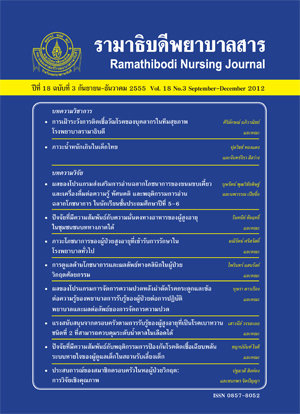ประสบการณ์ของสมาชิกครอบครัวในหอผู้ป่วยวิกฤต: การวิจัยเชิงคุณภาพ
Main Article Content
Abstract
บทคัดย่อ
การศึกษาเชิงคุณภาพครั้งนี้มีวัตถุประสงค์เพื่อบรรยายประสบการณ์ของครอบครัวของผู้ป่วยที่เข้ารับการรักษาในหอผู้ป่วยวิกฤต โรงพยาบาลสังกัดกระทรวงสาธารณสุขผู้ให้ข้อมูลเป็นบิดา มารดา คู่สมรสของผู้ป่วยผู้ใหญ่เจ็บป่วยวิกฤตในโรงพยาบาลทั่วไปและโรงพยาบาลศูนย์ จำนวน 12 ราย เก็บรวบรวมข้อมูลในเดือนมกราคม ถึงเดือนกุมภาพันธ์ พ.ศ. 2554 โดยการ สัมภาษณ์แบบเตรียมคำถามไว้ล่วงหน้า พร้อมทั้งบันทึกเทปและบันทึกภาคสนาม ใช้ระเบียบวิธีวิจัยเชิงคุณภาพตามแนวคิดปรากฏการณ์วิทยา ผลการศึกษาพบว่า ครอบครัวได้สะท้อน ประสบการณ์เมื่อสมาชิกครอบครัวเข้ารับการรักษาในหอผู้ป่วยวิกฤต 4 ด้าน ได้แก่ 1) ด้านจิตใจ และอารมณ์ ได้แก่ ความวิตกกังวล รู้สึกสับสน หมดหวัง และกลัวว่าผู้ป่วยเจ็บปวด ทุกข์ทรมาน หรือเสียชีวิต 2) ด้านบทบาทหน้าที่ของครอบครัว ครอบครัวดำเนินชีวิตด้วยความยากลำบาก ต้องช่วยประคับประคองจิตใจ ดูแลสมาชิกในครอบครัวคนอื่นให้ดำเนินชีวิตใกล้เคียงกับปกติ รวมถึงการวางแผนดำเนินชีวิตในอนาคตถ้าผู้ป่วยเสียชีวิต 3) ด้านเศรษฐกิจ ครอบครัวต้อง ดิ้นรนหาทรัพย์สินมาใช้จ่ายขณะที่เฝ้าดูอาการผู้ป่วยในโรงพยาบาลและต้องเลี้ยงดูสมาชิกครอบครัวคนอื่น และ 4) ด้านร่างกาย การเข้ารับการรักษาในหอผู้ป่วยวิกฤตของสมาชิกครอบครัว ส่งผลต่อการรับประทานอาหาร การนอนหลับ บางรายเกิดความเจ็บป่วยต้องกลับไปพักที่บ้าน แม้ว่าจิตใจยังเปี่ยมไปด้วยความกังวลต่ออาการของผู้ป่วย ครอบครัวให้นํ้าหนักต่อประสบการณ์ และแสวงหาการดูแลเพื่อตอบสนองด้านจิตใจมากที่สุด ซึ่งบางครอบครัวเท่านั้นที่บอกเล่าความรู้สึก และความต้องการให้พยาบาลที่ปฏิบัติงานในหอผู้ป่วยวิกฤตทราบ ดังนั้นนอกเหนือจากการ ดูแลผู้ป่วยแล้ว พยาบาลควรสนใจและดูแลครอบครัวผู้ป่วยด้วย เช่น การสอบถาม พูดคุยเกี่ยวกับประสบการณ์ ความรู้สึก ตลอดจนปัญหาด้านต่าง ๆ เพื่อช่วยเหลือให้ครอบครัวผู้ป่วย สามารถปรับตัวและดำเนินชีวิตท่ามกลางภาวะวิกฤตต่อไปได้
คำสำคัญ: ครอบครัวของผู้ป่วยวิกฤต ประสบการณ์ของครอบครัว การวิจัยเชิงคุณภาพ
Abstract
The aim of this paper was to reflect experiences of family members who their loved ones were admitted in intensive care units of Ministry of Public Health hospitals in Thailand. Data were collected using a criterion sampling in General and Regional hospitals through guided question interviews (n = 12) from December 2010 to February 2011. All interviews were transcribed verbatim by coding data using the constant comparative method as proposed by descriptive phenomenology. Relatives’ experiences were categorized into four themes: 1) Psychological impact including anxiety, confusion, hopeless, and fear that the patient would encounter pain and suffering or die; 2) Roles and responsibilities impact including facing difficulty in assuming roles in order to run their family, providing emotional support to other relatives in order to maintain their usual life, and planning for family future in case of patient fatality; 3) Financial resource impact including income deficit and taking loan while the patient stayed in hospitals; and 4) Physically episodes including changes in eating and sleeping patterns resulting in relative's health. Psychological impact was the most prominent theme. However, it was found that only a small number of relatives communicated with intensive care unit nurses regarding their concerns, needs, and expectations. Therefore, besides caring for critically ill patients, nurses should be encouraged to extend their care to relatives by assessing family needs and expectations in order to help each family to adapt and live their lives through this crisis.
Keywords: Critical patient family, Relatives experience, Qualitative research
Article Details
บทความ ข้อมูล เนื้อหา รูปภาพ ฯลฯ ที่ได้รับการตีพิมพ์ในรามาธิบดีพยาบาลสาร ถือเป็นลิขสิทธิ์ของวารสาร หากบุคคลหรือหน่วยงานใดต้องการนำทั้งหมดหรือส่วนหนึ่งส่วนใดไปเผยแพร่หรือเพื่อกระทำการใด ใด จะต้องได้รับอนุญาตเป็นลายลักษณ์อักษรจากรามาธิบดีพยาบาลสารก่อนเท่านั้น


